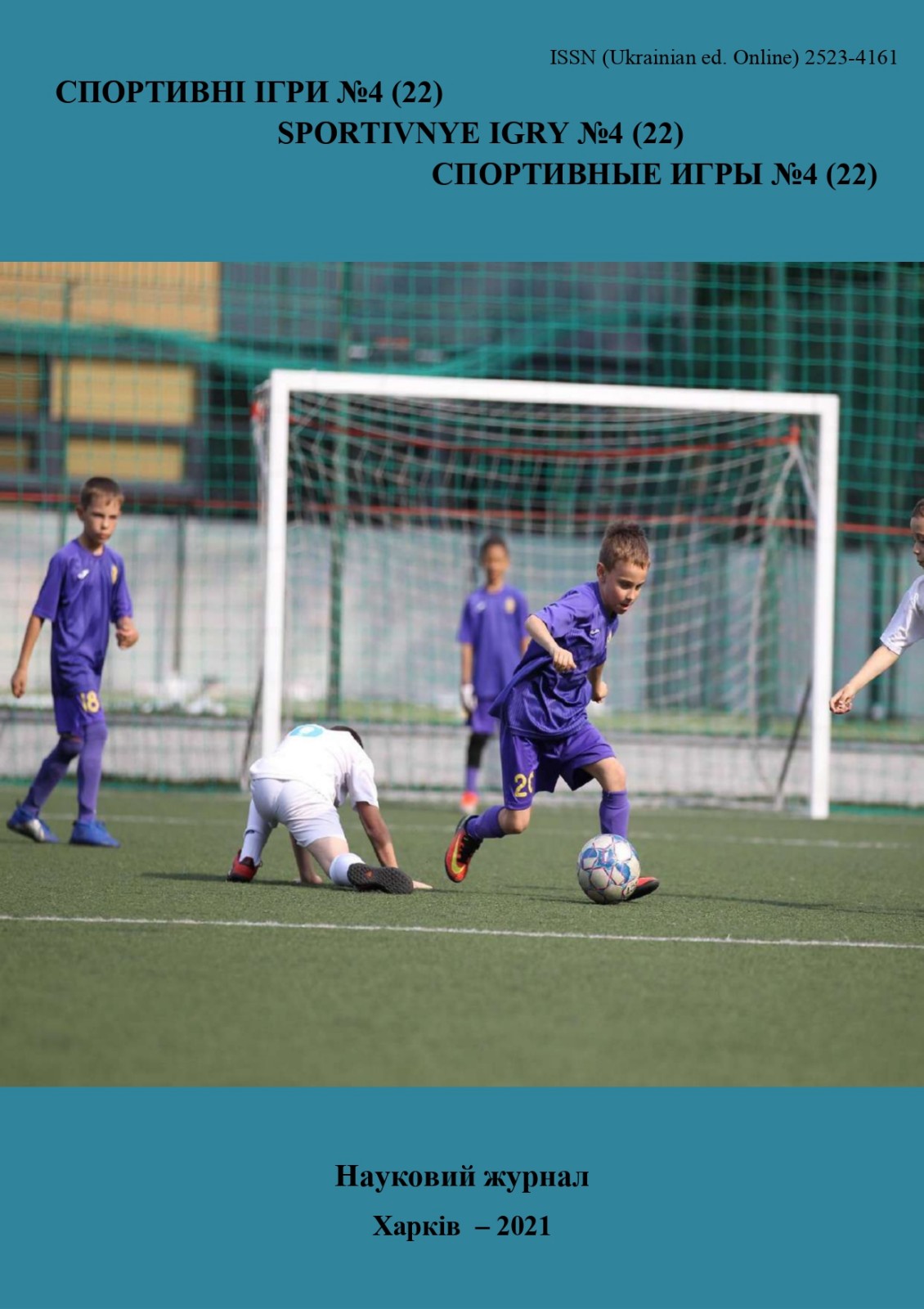Дослідження базової интерпретативної перспективи тренерського менеджменту в спеціальних спортивних класах
DOI:
https://doi.org/10.15391/si.2021-4.10Ключові слова:
менеджмент, розвиток спортсменівАнотація
Адміністрація організації з метою досягнення поставлених цілей повинна максимально ефективно використовувати наявні у неї ресурси. Організація є ефективною, якщо її адміністрація з метою досягнення запланованих завдань використовує оптимальні принципи керівництва, ефективні види діяльності в рамках установи. Для оптимізації управління необхідно розглядати кілька аспектів, таких як: організаційна структура, розвиток спортсменів і обмеження всередині організації. Мета даного дослідження – визначити систему управління спортивними класами в SMP Negeri 1
Surakarta. Даний тип дослідження включає якісні дослідження, базові інтерпретаційні
дослідження. Дослідники використовували метод інтерв'ю, спостереження і
контентаналіз. У даному дослідженні використовувався збір даних, їх аналіз та
узагальнення, представлення даних і формування висновків. Результати даного дослідження показують, що адміністрація організації, в якій функціонують спеціальні спортивні класи SMP Negeri 1 Surakarta, здійснювали функції управління, включаючи планування, організацію, керівництво і контроль. Спеціальні спортивні класи SMP Negeri 1 Surakarta мають дві моделі тренерської роботи, а саме тренувальну і освітню. Тренер подає заявку на програму періодизації тренувань. В кінці кожного року проводиться оцінка результатів роботи, ефективності тренувальних програм, наданих тренером, досягнень спортсменів і проблем, що виникають в роботі спеціальних спортивних класів SMP Negeri 1 Surakarta.
Посилання
Adi S., A., & Soenyoto, T. (2020). Sport Specific Class Analysis And Urgency. Jp.Jok (Jurnal Pendidikan Jasmani, Olahraga Dan Kesehatan), 3(2), 192-200. https://doi.org/10.33503/jp.jok.v3i2.790
Adzalika, A.R., Soegiyanto, & Rumini (2019). The Evaluation of Athletes’ Achievement Coaching Program of Measurable Sports (Athletics, Weightlifting, Archery, and Swimming) in Lampung Province. Journal of Physical Education and Sport, 8(1), 56-61. DOI https://doi.org/10.15294 /jpes.v8i1.26843
Allung, J.R., Soegiyanto, & Kusuma, D. W. Y. (2019). Evaluating Coaching Achievement Taekwondo Sports Branch of Students Development Center and Sport Training NTT. Journal of Physical Education and Sports, no 8(2), 116-120. DOI https://doi.org/10.15294 /jpes.v8i2.27486
Andriani, A., & Awang Irawan, F. (2019). Coaching Evaluation for Women’s Volleyball Sports Year 2018 Semarang City Article Info. Journal of Physical Education and Sports, no 8(1), 11–18.
Dania, A., & Karteroliotis, K. (2016). The association between exercise type and students’ academic performance within school-based physical activity programs. ICERI2016 Proceedings, 8508–8515. https://doi.org/10.21125/iceri.2016.0939
Hancock, D.J., Rymal, A.M., Ste-Marie, D.M., Varnes, J.R., Stellefson, M.L., Janelle, C.M., Dorman, S.M., Dodd, V., Miller, M.D., Crawford, J.J., Gayman, A.M., Tracey, J.,
Brown, H.E., Lafferty, M.E., Triggs, C., Esfandiari, A., Broshek, D.K., Freeman, J.R., Asif, I.M., … Pedrosa, I. (2014). The Role of Gender in Educational Contexts and Outcomes.
Psychology of Sport and Exercise, no 13(3), 48-55. https://doi.org/10.1016/j.pmr.2005.03.002 Harris-Reeves, B. E., Skinner, J., Milburn, P., & Reddan, G. (2016). Applying Behavior Management Strategies in a Sport-Coaching Context. Journal of Coaching Education, no 6(2), 87-102. https://doi.org/10.1123/jce.6.2.87
Iswoyo, T., Kristiyanto, A., & Doewes, M. (2018). Sustainability of Sport-Specific Class in Senior High School. International Journal of Multicultural and Multireligious Understanding, no 5(5), 317-323. https://doi.org/10.18415/ijmmu.v5i5.460
Lumintuarso, R., Suharjana, Widiyanto, & Ndayisenga, J. (2021). Sports management of indonesian sports athletics preparations in Asian games 2018. International Journal of Human Movement and Sports Sciences, no 9(1), 56-61. https://doi.org/10.13189/saj.2021.090108
Nicolas, M., Gaudreau, P., & Franche, V. (2011). Perception of coaching behaviors, coping, and achievement in a sport competition. Journal of Sport and Exercise Psychology, no 33(3), 460-468. https://doi.org/10.1123/jsep.33.3.460
Radošević, I., Gavrilović, A., Parčina, I., & Ahmić, D. (2020). Coaching management in the sports industry. Sport Science, no 13(2), 134-141.
Rahmad, F., Kristiyanto, A., & Riyadi, S. (2019). The Achievement-Driven Coaching Management Of Early-Age Football Sport At Tunas Muda Football School In Bengkulu City. Journal of Education, Health and Sport, no 9(4), 231-243.
Salahuddin, M., Haluti, A., & Nurhikmah. (2021). Futsal sports coaching achievements of Banggai regency (A case study in Banggai regency). International Journal of Human Movement and Sports Sciences, no 9(1), 117-123. https://doi.org/10.13189/saj.2021.090116
Santos, F., & Callary, B. (2020). An athlete’s journey to become a positive development-focused coach through professional football: moving between theory and practice. Sports Coaching Review, no 9(1), 71–94. https://doi.org/10.1080/21640629.2018.1558897
Valentino, R.F., & Ardian, A. (2017). Hubungan antara Kecerdasan Emosional dengan Prestasi Belajar Siswa Kelas Khusus Olahraga. Jurnal Olahraga, no 3(1), 41-50.
https://doi.org/10.37742/jo.v3i1.71
Vural, M., & Çoruh, Y. (2019). The effect of students of sports management and coaching education department on entrepreneurial tendencies of career plans. International Journal of Evaluation and Research in Education, no 8(2), 351-355. https://doi.org/10.11591/ijere.v8i2.16319
Widianto, B.K., Kristiyanto, A., & Liskustyawati, H. (2020). The Implementation of Football Sports Coaching Management at Darul Huda Mayak Ponorogo Islamic Boarding School. Budapest International Research and Critics in Linguistics and Education (BirLE) Journal, no 3(4), 2282-2291. https://doi.org/10.33258/birle.v3i4.1511











